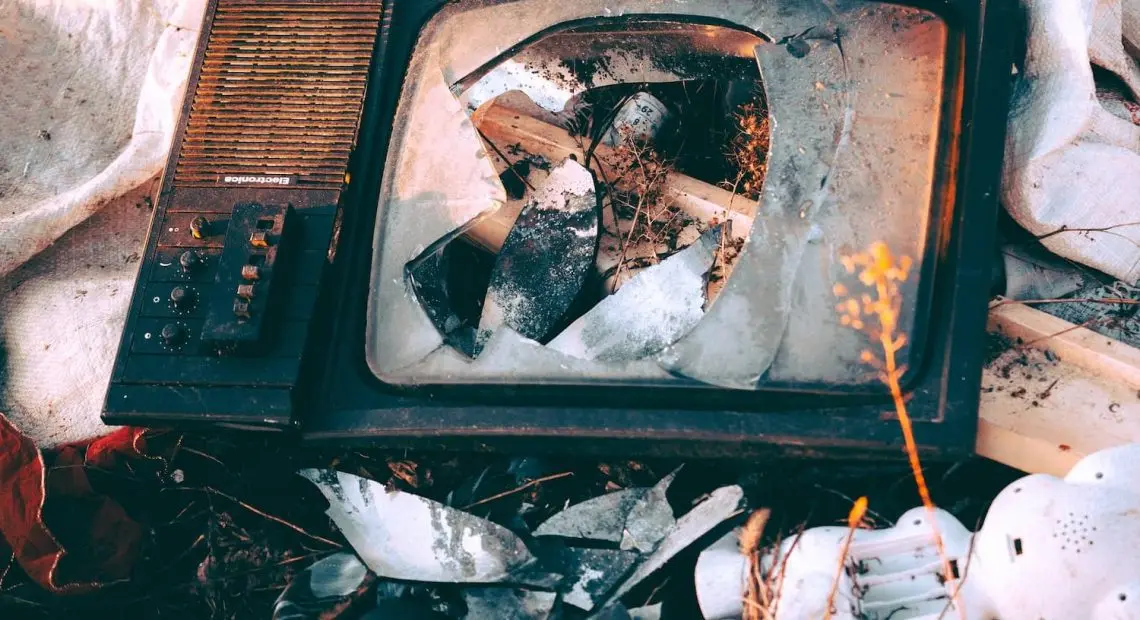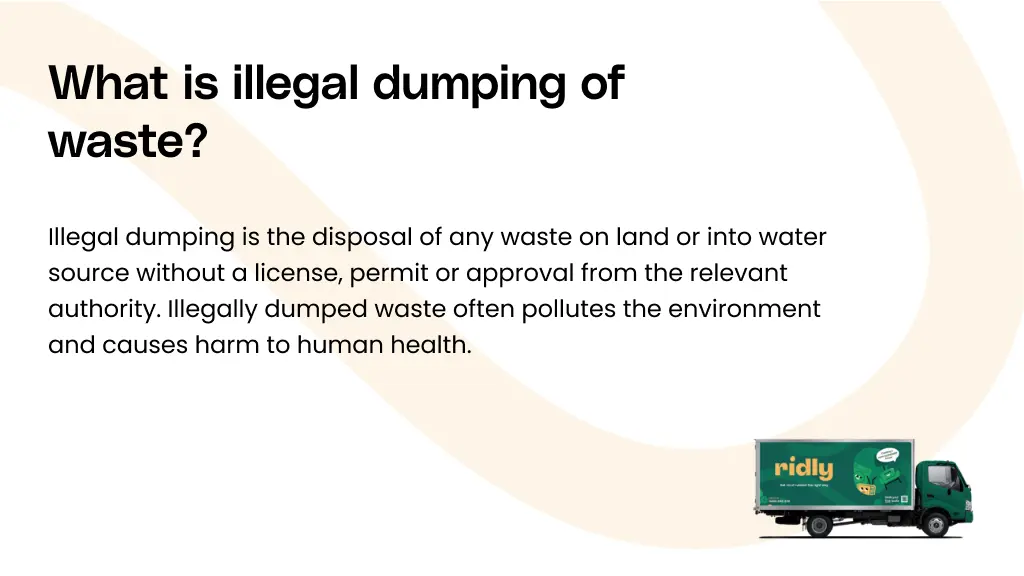
If you need to shift some household rubbish, it’s worth asking yourself: “what is illegal dumping of waste?”. It’s a question that will help you avoid inadvertently dumping any items unlawfully, save you money, help the environment, and generally ensure your neighbour’s happiness too!
It might surprise you to know the official illegal dumping definition includes everything from what we might think of as “minor” littering in urban areas to large scale disposal of harmful materials in bushland areas. It’s a serious problem with environmental, social, and financial implications and should be avoided at all costs. Keep reading for a rundown of the do’s and don’ts when it comes to disposing of your unwanted household items, green offcuts and chemical waste in Australia.
What Is Illegal Dumping of Waste?
Illegal dumping is the disposal of any waste on public or private land or into a water source without a license, permit or approval from the relevant authority such as the local council or the Environmental Protection Agency (EPA). Items that are commonly found illegally dumped include general household rubbish, furniture, white goods, mattresses, garden waste, building waste and hazardous materials such as asbestos.

It’s not hard to imagine how serious the environmental, financial, and social implications are from the unlawful disposal of waste. Dumped green waste can cause weed and pest infestations, chemicals contaminate soil and water, and more often than not one instance of dumping will attract more dumping events. Illegal dumping diminishes community pride and repels visitors. It costs communities around Australia thousands of dollars every year to clean up and dispose of items that were illegally dumped.
Is It Illegal to Dump Rubbish?
Yes, all rubbish dumping outside of the council-provided specifications is illegal. If you’re asking yourself: “what is illegal dumping of waste?”, you also need to think about the potential fines for illegal dumping, which start at $4000 for individuals and $8000 for corporations. Maximum penalties for individuals can be up to $250 000 and, in the case of a continuing offence, a further daily penalty of $60,000. The charge is $1 million for corporations and in the case of a continuing offence, a further daily penalty of $120,000.
Wilful or negligent disposal of waste causing actual or likely harm to the environment can attract serious fines. The maximum penalty for an individual is $1 million and/or a 7-year prison sentence for wilful offences and $500,000 and/or 4-year prison sentence for negligent offences. For a corporation, the maximum penalty is $5 million for wilful offences and $2 million for negligent offences.
Illegal Dumping of Green Waste
In just one local government area (LGA) in Northern NSW during 2017-18 there were 436 tonnes of illegally dumped material cleaned up and disposed of with estimated costs to the council and community of $540,000. This includes a high proportion of dumped green waste.
If you’re wondering: “is it illegal to dump soil?” the answer is yes! Green waste includes branches, lawn clippings, and soil, all of which is a serious threat to native bushland reserves. Green waste leads to the spread of weeds and the pollution of waterways with excess nutrients blocking the naturally occurring drainage lines. The accumulation of dead vegetation and green waste significantly increases the risks of bush fires.
Illegal Dumping of Chemical Waste
In the same LGA in Northern NSW during 2017-18 there were 1 958 illegal dumping incidences, including 61 asbestos dumping incidents. Dumped waste containing chemicals, including asbestos and toxins from plastic, can leach into the soil and water contaminating the environment for long periods at a time. Both native animals and humans can be poisoned by these toxic substances that contaminate the natural environment. If a bushfire occurs at a time when there’s roadside dumping around toxic fumes from burning household and electrical goods, tyres, chemicals, paint, thinners, and asbestos put firefighters, local residents, and the environment at great risk.

Report illegal dumping
It might feel wrong to report your neighbours, but lots of anti-dumping organisations and LGA’s routinely ask for locals to be vigilant against dumping. It’s not enough to wonder: “what is illegal dumping of waste?” if you don’t do anything about it. Accountability can help decrease the acceptability of dumping practices in your local area and can help authorities identify repeat offenders. According to the EPA, you can help by:
1. Discouraging your friends and neighbours from dumping rubbish or green waste in bushland, parks or on the street. How acceptable dumping is within a community has a direct effect on how prevalent it is.
2. Contact your LGA to make sure you’re taking advantage of all the available waste and recycling services available to you. Most councils will offer some sort of free waste pick-up service or drop off facility for chemical products. According to the EPA 18-29 year olds tend to report lower levels of awareness of legitimate means of waste disposal so finding out what’s on offer can help you make an informed decision about waste disposal.
3. If you see someone illegally dumping anything take note of the time of day, registration number, make, model and colour of their vehicle and a description of the person if possible. You can report them to your local council or the designated organisation for environmental protection in your state.
How Do I Legally Dispose of Unwanted Items?
Approximately 63% of all dumped rubbish is household general waste, furniture, carpets, clothing, and white goods. The truth is that furniture, carpets, clothes and white goods all wear out or break eventually, so there’s a legitimate need to throw items out from time to time. Disposing of your unwanted household items illegally can put a drain on your local government authorities, the environment, and neighbours, so it’s important to work out the best way to go about it.
Green Waste
Garden waste belongs in your green bin as provided by the local council. This is important to get right as green waste is typically recovered and processed into compost and mulch. Be careful not to contaminate your green waste with other rubbish, even if it’s organic food scraps, pet waste or soil, as the presence of this matter will make composting impossible.
Chemical Waste
Each local council will have its own specific guidelines for disposing of chemical waste. Some items may be able to go in the normal rubbish or recycling bins depending on the item. For example, empty paint cans can be recycled in the recycling bins, but if they still contain wet paint they need to be disposed of at a Household Chemical ClearOut event or a council waste depot.
Household Items and White Goods
Household items like furniture and white goods are usually accepted by neighbourhood recycling centres and council waste depots. As of 2021, there are more than 90 community recycling centres across New South Wales. It is worth noting that there is a lot of variation between different centres as to their environmental credibility with some disposing of goods in a less than ideal way. If your household goods are still in good working order you could also consider selling, donating, or recycling them.

Ridly Rubbish Disposal
Having successfully answered the question: “what is illegal dumping of waste?”, the thought of sorting, categorizing, and dropping off your household rubbish can be a bit overwhelming, especially if you’re concerned about disposing of your items legally and in an environmentally responsible manner. If you don’t have the headspace or time to deal with waste depots or council clear out days, then the simplest option is to call in the experts.
At Ridly, we’re all about quick, convenient, and affordable rubbish removal. We assess every piece of rubbish we pick up and reuse, recycle, donate, or convert as much of it as possible. We’re not the kind of company that’ll just take everything to the tip because it’s easier, we’re committed to protecting the environment by finding every possible alternative that doesn’t involve landfill.
According to the Australian Bureau of Statistics, Australian households generate 12.4 million tonnes of waste annually and it costs anywhere between $20 000 to more than $75 000 for LGAs to manage illegally dumped rubbish, depending on location. Clearly, effective garbage disposable is no small matter when you consider how much we produce and how much it costs to clean up after illegal dumpers.
Starting at just $69, we offer a sustainable and affordable service that will take the stress out of garbage disposal. For the same price as many other garbage removal services, we’ll pick up your unwanted goods, sort them and then dispose of them in the most appropriate way. We aim to recycle everything that we collect putting out clients and the environment at the heart of everything we do. We’re proud to be known as Sydney’s greenest rubbish removal company! We specialise in green waste removal, white goods removal, household rubbish removal and commercial waste removals. Call us on 0491 181 130 to discuss your rubbish removal needs or request a quote online.